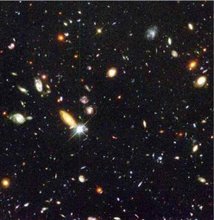I like relativity and quantum theories
because I don’t understand them
and they make me feel as if space shifted about like a swan that
can’t settle,
refusing to sit still and be measured;
and as if the atom were an impulsive thing
always changing its mind.
~ D. H. Lawrence
I have a Swiss cheese kind of science background—substantially rich in some places, holes in other places. Explain why a clock ticks faster as it nears the event horizon, no problem; add numbers larger than the amount of fingers I have, that’s asking a lot. Bifurcate a logistic equation, sure; multiply fractions . . . I have no idea how to multiply fractions.
Among the many and varied causes of this Swiss discrepancy are two major contributors: The first is the jerk who sat behind me in 7th grade math class. Jerk put bugs in my hair unbeknownst to me until sometime toward the end of class when the bugs migrated from my head and commenced roaming the rest of my topography. The discomfort caused by the insects was negligent compared to the devastating humiliation caused by sneering, pointing peers, so, I never went back. Hence, a mathematical education that does not exceed the 7th grade level, and, holes. I quit going to the rest of my classes shortly thereafter, having concluded that school was for learning about humiliation, fear, and self-loathing, and not where I could learn about what makes clouds look the way they do or how those rings around Saturn got there in the first place. A few bad years and a lot of dangerous substances later, I re-entered school as high school student, where I met the second major contributor.
Pete taught science classes at the alternative high school I attended, introduced me to what would become an insatiable, absorbing passion for scientific understanding, and saved my life. I was fortunate enough to attend Pete’s Space Science class where I discovered that I was not stupid, just miseducated, and that science, more than anything else, yielded the most satisfactory answers to my insufferable and growing tower of mostly unanswerable questions. Thus began some filling in of the empty spaces.
I became addicted to Scientific American. I read Asimov, Feynman, Hawking, Gribbin, and Davies. I read about atoms, relativity, quantum theories, chaos theories, Gödel’s incompleteness theorem, the paradox of self-referential systems, history of science, and philosophy of science. I even received a [fancy tech school] “Medal of Achievement in Math and Science” and a small scholarship because the admissions committee assumed I had the mathematical qualifications due to the high level of promise I demonstrated in my science classes.
In college I took all the chemistry, physics, astronomy, biology, and botany classes I could take without calculus prerequisites and taught myself the math I needed on a case by case basis. I am in love with covalent bonding, I dream chemical reactions, and I have a veritable encyclopedia of astronomical and botanical lore and nomenclature stored in my brain.
When I enrolled in college for the first time (a long time ago), I fully intended to be a Physics major and go on to become a Professor of Physics. I registered for pre-algebra three times and finally passed on the fourth try. I was yet undaunted and still cultivated dreams of theoretical physics notoriety. I would say that naivety is the mother of courage. During the subsequent decade of my on-again-off-again college career I would register and withdraw from college algebra more times than I have fingers. However, because I understand now that learning mathematics requires a step ladder process, and I could not seem to leap up even to the bottom rung, I finally gave up trying to take college algebra—bye-bye Physics major, hello Arts and Letters.
I still want to become a Physics Professor. I took Complexity in the Universe I with the noted physicist Dr. Semura and more than once he suggested I become a Physics Professor. I take this to be the greatest compliment I have/will ever receive in my life-time. I followed up with Complexity in the Universe II and discovered that I really enjoy writing science based, big questions, what-does-it-all-mean-reflection stuff. So, what does an Arts and Letters major who loves science but can’t add, and who loves writing but wants a steady income, grow up to be? A restaurant manager. An art school applicant. An avid “science for the lay person” reader. And maybe, someday, a poet.



2 comments:
I was a Physics major for a year and a half. I had lofty ideas about doing Research. Then I realized I really just liked solving difficult problems. :)
Funny thing about advanced science - it looks less like school stuff and a lot more like abstract art on the mind's conceptual tapestry. That's why your good at it. I'd leave the simple stuff to the dummies who can't paint - engineers, techies, ect...concentrate on the big things:save the planet, convince people to start thinking for themselves, fight for love and beauty, teach people to dream again (like when they were kids) before they got broken. These are the things few people can do... except people like you.
Post a Comment